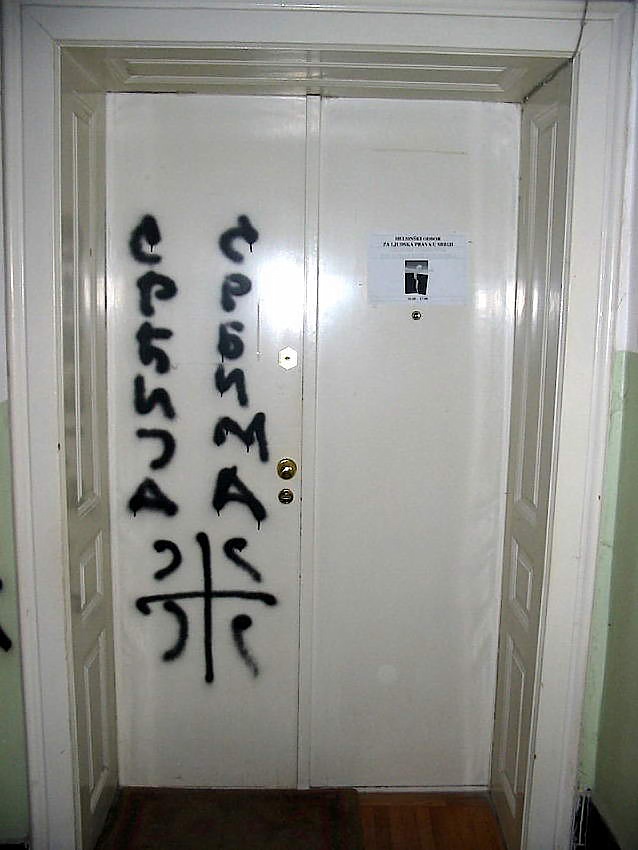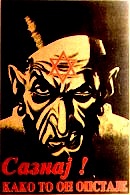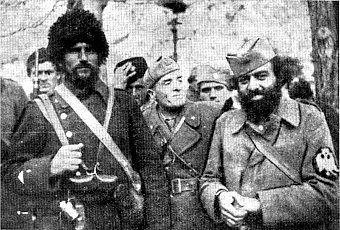 60 years after WWII Holocaust U.S. Awards Nazi Collaborator "Legion of Merit" |
 Latest available OSS documents(declassified Dec. 31, 2004) Latest available OSS documents(declassified Dec. 31, 2004) |
| In the shadow of shame | Remember Vukovar | |||
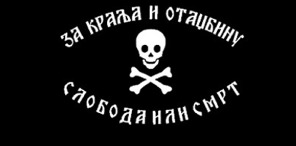
 May 12, 2005 - US President Hari Truman(March 29, 1948) has posthumously decorated General Mihailovich with the Legion of Merit "for his contribution in victory of the allies over fascism". May 12, 2005 - US President Hari Truman(March 29, 1948) has posthumously decorated General Mihailovich with the Legion of Merit "for his contribution in victory of the allies over fascism". Referring to speculations that the decoration was presented in secrecy, US Ambassador in Belgrade Michael Polt said that "the only reason for giving of the decoration to General Mihailovich was because he had save the lives of 500 American pilots in WWII".General Mihailovich's daughter Gordana said that she would give the decoration presented to her father to the Serb Orthodox Church. Source: Newspaper Blic, Beograd, Serbia. |
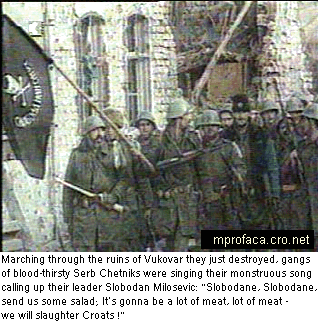  СЛОБОДАНЕ, СЛОБОДАНЕ, СЛОБОДАНЕ, СЛОБОДАНЕ, БИТ ЋЕ МЕСА - КЛАТ ЋЕМО ХРВАТЕ ! ("Slobodane, Slobodane, šalji nam salate; bit će mesa, bit će mesa - klat ćemo Hrvate!...") Those were the words of the song Serb Chetniks were singing, marching under the black flag with a big white skull on it, through destroyed Croatian town Vukovar in autumn of 1991, a scene taken by BBC reporter. Croatian community in Great Britain protested to BBCwhy those words, heard so clearly and loudly, were not translated for English audience. In that piece showed on BBC TV after that, BBC blacked out the tone of mentioned song instead... The first version with the tone and clearly recognized words of Serbian song was shown on NTVand CNN, but also not translated for their English speaking audience. Enough about Chetnik in the U.S. and British media. Mario Profaca | |||
|
Kosovo paper criticizes US for decorating Serbian Chetnik leader The official US explanation, at least based on what the media officials of that country have said, is that "The decoration for Draza Mihailovich has nothing to do with the present-day US policy, and that the medal was given in 1948 by President Harry Truman." However, even if symbolic, this gesture on the part of the Americans greatly harms the image of the United States, which is first on the list of those countries that condemn war crimes and urge dealing with them. It offends the victims and rehabilitates a movement that was the biggest motivation for the movements that caused the latest wars in the territories of the former Yugoslavia. It was precisely the Chetnik idea about a greater Serbia - which was so extensively applied by [former Yugoslav president] Slobodan Milosevic - that motivated hundreds of thousands of Serbs to join the ranks of the Yugoslav Army to crack down on Vukovar, to destroy Dubrovnik, to keep Sarajevo under siege for years, and to slaughter 8,000 Bosnians in Srebrenica. With that very idea, they continued their campaign of ethnic cleansing in Kosova, by committing the heaviest crimes in the same place that Draza Mihailovich's Chetniks had done in Kosova, in Drenica [central Kosovo]. Source: Text of report by Augustin Palokaj entitled "Little criticism of our American friends" published by the Kosovo Albanian newspaper Koha Ditoreon 16 May via Kosova Report, May 17, 2005. | ||||
 From the US Holocaust Memorial Museum From the US Holocaust Memorial Museumto the U.S. war veterans with love ... |
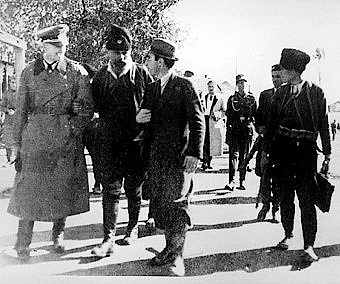 Kosta Pečanac, the pre-war president of the Chetniks and Dazafer Deva (a collaborator from Kosovo) in Podujevo.[Photograph #46716] Date:Oct 20, 1941; Locale: Podujevo, [Serbia; Kosovo] Yugoslavia Credit: United States Holocaust Memorial Museum courtesy of Muzej Revolucije naroda i narodnosti Jugoslavije Copyright:Public Domain Subject Classification: Invasion & Occupation -- Yugoslavia -- General -- Nazi Collaborators Anti-semitism in Serbia during the World War II The physical liquidation of Serbian Jews began immediately in the spring of 1941. Almost all the men were killed by the autumn and the women and children and the remaining men were liquidated at the end of April and the beginning of May, 1942. The exact number of people killed is not known even from Jewish sources. Historian Jasa Romano, however, has come to the conclusion that 88% of all Serbian Jews were killed. The Serbian historian Sretenije Zrokić says that of the 11,870 Belgrade Jews only 1,115 or 9% survived the war. It was not only the Germans who captured and killed the Jews in Serbia, rather it was the Serbian Police, Nedić's volunteers and Chetniks . Most were killed in the Sajmište and Banjica concentration camps. Not a single Jew managed to escape from the camps. Source: Ljubica Stefan, Anti-semitism in Serbia during the World War II 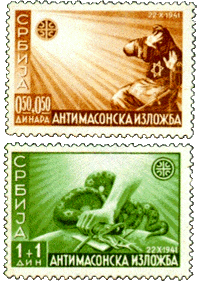 she lived for 30 years, researches genocide against Albanians, anti-Semitism and persecution of Jews, as well as the behavior of Serbia and the Serbian Orthodox Church in World War II. The name is derived from the Serbian word četawhich means "company" (of about 100 men). Allied Attitude Toward the Chetniks At first, the western Allies had viewed the Chetniks as the core of the resistance movements in Yugoslavia against the invaders. But reports from British parachutists who had joined the fighting forces in Yugoslavia began to reach the West, indicating that the Chetniks' policy was to fight the partisans under Tito, rather than the Germans and their allies. Consequently, the attitude of the western Allies underwent a change in the second half of 1942, and they switched their aid to the partisans who were fighting the Germany enemy. By the end of 1943, the break between the West and the Chetniks was complete. The Chetniks had become collaborators and had joined the forces fighting the partisans. After the occupation of Serbia by the partisans and the Red Army, the Chetniks were hunted down. Shortly after the end of the war, Mihailovich and his men were captured and brought before a Yugoslav national tribunal; most were hanged.
At the initial stage, there were some Jews among the Chetniks, but when it turned out that the Chetniks were not fighting the invaders and their collaborators, and in fact were inclined to cooperate with them, the Jews switched to the ranks of the partisans. As the Chetniks increased their cooperation with the Germans, their attitude toward the Jews in the areas under their control deteriorated, and they identified the Jews with the hated Communists. There were many instances of Chetniks' murdering Jews or handing them over to the Germans. The Destruction of the Jews The German military administration in Serbia implemented the extermination of the Jews in its area with dispatch and thoroughness. In the very first days of the occupation the Jews were ordered to register, and anti - Jewish regulations were issued. For several months afterward, most of the male Jews were put on forced labor. After the outbreak of the revolt in Serbia in July 1941, all the male Jews were put in concentration camps, most of them in Topovske Šupe, and others in Šabac and in Niš.
The turn of the women and children came at the beginning of December 1941, when they were imprisoned in the Sajmište camp. In March 1942 a gas van was brought in, and eight thousand women and children were murdered between March and May. Courtesy of: Encyclopedia of the Holocaust ©1990 Macmillan Publishing Company, New York, NY 10022 and Simon Wiesenthal, Museum of Tolerance Multimedia Learning Center United States Holocaust Memorial Museum SEE ALSO: | |||||||||||||||||||
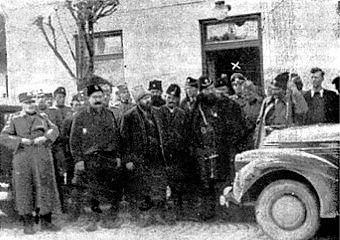 | A German officer is shown by a cross. Credit: United States Holocaust Memorial Museum courtesy of Muzej Revolucije Narodnosti Jugoslavije Copyright:Public Domain Subject Classification: Invasion & Occupation -- Yugoslavia -- General -- Nazi Collaborators |
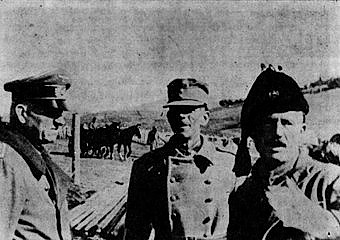 |
stands alongside an Croatian Domobrans (Homeguard) officer and Chetnik Commander Rade Radić in central Bosnia [Photograph #46717] Date:Apr 1942 - Jun 1942 Locale:[Bosnia-Hercegovina] Yugoslavia Credit: United States Holocaust Memorial Museum courtesy of Muzej Revolucije naroda i narodnosti Jugoslavije Copyright:Public Domain Subject Classification: Invasion & Occupation -- Yugoslavia -- General -- Nazi Collaborators |
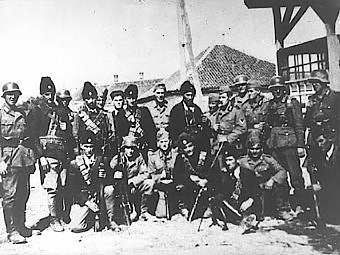 | [Photograph #46712] Date:1941 - 1945; Locale:[Serbia] Yugoslavia; Credit: United States Holocaust Memorial Museum courtesy of Muzej Revolucije naroda i narodnosti Jugoslavije Copyright:Public Domain Subject Classification: Invasion & Occupation -- Yugoslavia -- General -- Nazi Collaborators |
OSS Intelligence Unit in Draza Mihailovich's camp
was not in any sense "American Military Mission to Draza Mihailovich"
| ||||||||||||||||
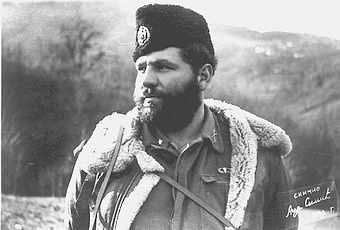 (ЋОРЋЕ МУСУЛИН, an American of Serbian heritage), in chetnik uniform after he joined Mihailovich's chetniks. "Beloved Chetniks" ... "Back at the OSS base in Bari, Italy, Musulin learned of the progress of the war and in particular of the Allied policy in relation to General Mikhailovich. He was shocked to find that his beloved Chetniks were accused of collaborating with the Germans, against whom he knew they were waging a relentless war. Worse than that, distressed American airmen were being briefed to bail out only in Tito Partisans dominated territory and not in Chetnik areas, because Mikhailovich was said to be turning shot-down Allied airmen over to the Germans. This OSS officer, who had just left the Chetniks and had taken forty Allied airmen with him knew this to be false; but he found himself a weak minority against the all-out support being given Tito and his charges against the Chetniks. On the other hand, he discovered that both the United States and Great Britain had numerous missions attached to Tito's forces. These missions were receiving all-out military support. Airmen who were forced to bail out in Tito areas were promptly aided by these missions and returned to their Italian bases; whereas with the departure of Musulin's mission from Serbia, there existed no comparable machinery to aid American aircrews forced to mail out in Chetnik zones. And this knowledge made Musulin fighting mad. American Air Corps boys, he argued, were entitled to rescue wherever they were, regardless of American or British political policy with regard to the Yugoslavian civil war. Furthermore, he knew that Mikhailovich was not turning over airmen to the Germans and to prove it, he would parachute blindly into Serbia!" Source: The 461st Liberaider, June 1995; Page 27, The Halyard Mission, by Lt. Com. Richard M. Kelly, USNR |
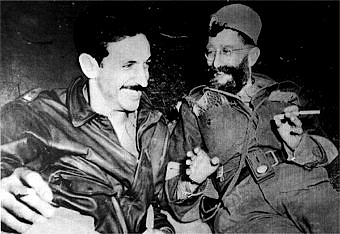 | (НИКОЛА ЛАЛИЋ, an American of Serbian heritage), with Draza Mihailovich. Photograph taken in September 1944 when Lalich "helpedUS Army Lt. Col. Robert H. McDowell" who wrote the famous Report to the OSS claiming he "never saw any type of collaboration between Mihailovich and the Germans" and "did notice however how much Draza hated them." |
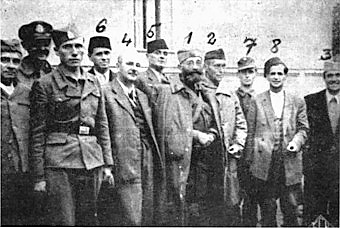 2) US Army Colonel Robert H. McDowell, 3) Mustafa Mulalić and a group of Ustashas Source: Web Archive - The Trial Of Dragoljub Draza Mihailovic - 1946 / (Mirror web site)
In the Ranger missionUS Army Lt. Col. Robert H. McDowell "with the help of Lieutenant Nick Lalich" (НИКОЛА ЛАЛИЋ,
an American of Serbian heritage), gathered intelligence on Nazi troop movements and wrote a report on Draza's Chetniks movement. McDowell wrote that he "never saw any type of collaboration between Mihailovich and the Germans" and "did notice however how much Draza hated them." Source: In Memoriam: Draza Mihailovich According to this photo, McDowell could testify that Draza Mihailovich was in love with Ustashas instead, but there is nothing about that (including this photograph) in McDowell's intelligence report mentioned. |
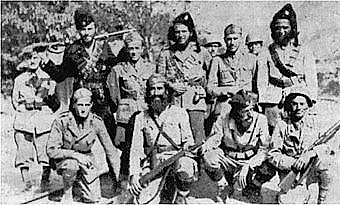 |
Source: Chetniks on Intelipedia was censored, removed from Serbiandraza-mihailovic.netand intelipedia.comweb sites |
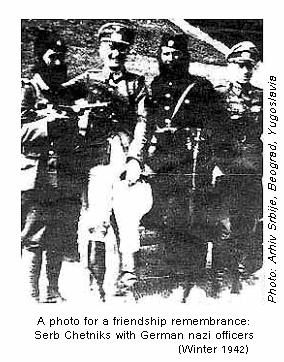 |
self-glorifying Serb Chetniks didn't mentioned that these Italians (on the photo above) were italian fascists. Chetnik collaborationism was mentioned just as "postwar communist propaganda". were removed from Serbian web draza-mihailovic.net. |
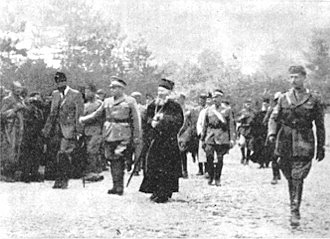 |
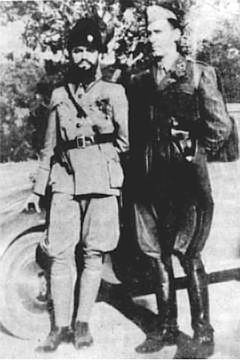 |
Chetniks handing over Mileta Okiljević, Partisan whom they have taken prisoner, to the Germans in Montenegro Source: draza-mihailovic.net removed from Serbian web site draza-mihailovic.net Of course, Partisans were U.S. allies, the anti-fascists, but, well... - who cares!
| 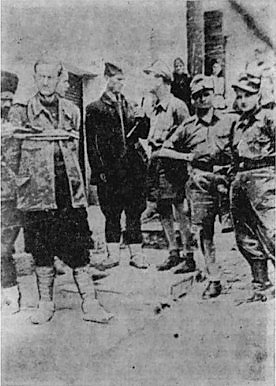 | ||||||||||||||||
|
SEE ALSO: 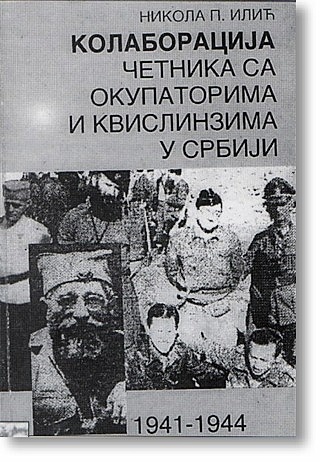
 History Revised: Executioners Turned Victims History Revised: Executioners Turned Victims By: Slobodanka Ast, May 13, 2005, Helsinki Committee for Human Rights in Serbia  Mihailovic without decoration Mihailovic without decorationDue to protest by Croatia and Bosnia and Herzegovina, the Legion for Merits that USA President Harry Truman decorated General Dragoljub Draza Mihailovic posthumously with, is not going to be officially presented to Mihailovic's successors on the Day of Victory over fascism. Presentation of the decoration has been postponed, but as 'Blic' finds out the date is still unknown. Source: Newspaper Blic, Beograd, Serbia, and IDIVIDI Portal, Skopje, Macedonia, May 13, 2005  President of Supreme Court yet another target President of Supreme Court yet another target of anti-semitic media lynch Belgrade, March 14, 2005 The Helsinki Committee for Human Rights in Serbia believes that all responsible media people in Serbia must be aware of the barrages of hate speech that were preparing the ground for the wars to be wagged in the territory of the former Yugoslavia, that were justifying and inciting these wars, that, along with their colleagues Slavko Curuvija and Milan Pantic, killed thousands and thousands of civilians. The same media bullets have prepared the terrain for Premier Zoran Djincic’s assassination. Nowadays, two years after this tragic loss for Serbia, they continue to mark some possible new targets through spreading overt anti-Semitism. Ever since October 5, 2000, and particularly after the December 2003 elections when the incumbent government was formed, the public discourse in Serbia has been growing into fierce, anti-Semitic argumentation. The same pattern ties two recent and seemingly different events. The first relates to the well-known and impermissible fact that no domestic official has found it suitable to attend the ceremony to mark the 60th anniversary of the liberation of Auschwitz that assembled main politicians from all over the world. The second took place just a couple of days ago at the closing of Belgrade’s cult film festival, FEST. The audience in the Sava Center applauded at the sentence Hitler had uttered just before his suicide, “The only thing I really succeeded to accomplish was the final solution to the Jewish issue.” The Helsinki Committee has repeatedly warned about such chilling tendencies characterizing more and more the Serbian society. That’s why the story occasioned by the election of the President of the Supreme Court, which the Tabloid biweekly announced at its front page in the issue of March 14, 2005, should not be perceived as an isolated incident and an isolated assault at one public figure. It was in one story alone that journalists Jelenko Majkic and Milovan Brkic managed not only to combine all the elements of the most shameful chapter of the history of Serbian journalism, but also to fill the holes missed by the author of the infamous news story “Curuvija Can Finally Welcomes Bombs.” Perfidiously underlining Judge Petrovic-Skero’s Jewish origin, the two journalists meticulously provided detailed information about her family, published the number of her private phone and home address and – to leave nothing to chance – captioned the house she lives in. Source: Helsinki Committee for Human Rights in Serbia Press Release, March 16, 2005  Jews pilloried today - who's the next Jews pilloried today - who's the nextPublic announcement of eight non-governmental organizations, Belgrade, March 4 2005 It is the eleventh hour for the Serbian public to rouse from the post-October lethargy. Radicalism growingly saturates public and political scenes alike. Both old and new advocates of fascist and anti-Semitic ideologies profusely exploit publishers’ policies and the advantages of new technologies. Domestic publishers have taken pains to add to the umpteenth edition of “The Elders of Zion” the “writings” the very ominous titles of which evoke the times of Munich brewpubs. As of recently, “Racial-nationalists of Serbia” have been fueling the racist blight spread by the organizations such as “Obraz,” “St. Justin,” “Svetozar Miletic” and others. The Serbian page of the US-based nazi website – which, apart from carrying anti-Semitic articles, publicized a list of Jews in Serbia – turned out to be an ideal vent for scores racists, anti-Semitists and fascists who have, so far, refrained from manifesting their feelings. Jews in Serbia – apart from having their graveyards desecrated, Holocaust memorials toppled, anti-Semitic graffiti and books stigmatizing them as major culprits for “everything that has befallen us” displayed all over – are now named names and subjected to overt threats. State authorities remain silent. Serbian intellectuals remain silent. The Serbian Orthodox Church remains silent. Nothing but a meek, verbal reproof breaks the silence from time to time. Source: Helsinki Committee for Human Rights in Serbia Press Release, March 4, 2005  IWPR Balkan Crisis Report IWPR Balkan Crisis ReportAnti-Semitism Raises its Head in Serbia By Dragana Nikolic-Solomon and Ljubisa Ivanovic in Belgrade (BCR No 544, 04-Mar-05) Though very small in number, Serbia’s Jewish community is being increasingly targeted by an array of ultra-nationalist groups. The slogans hint at a future settling of accounts. "Juden Raus", "Achtung Juden", "Jews out of Serbia" and "Death to Jews and Gipsies", they proclaim, the words providing a chilling echo of the Holocaust that decimated European Jewry more than half a century ago. But few Jews actually see these slogans in Serbia today. Providing ample proof of the claim that anti-Semitism doesn't need Jews to flourish, the latest wave of anti-Semitism in Serbia has broken over a community that is a shadow of its former self. Source: IWPR BCR No 544, March 4, 2005 |



